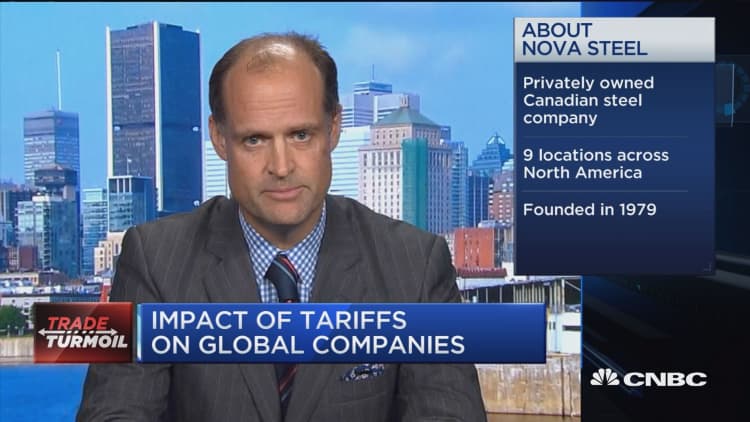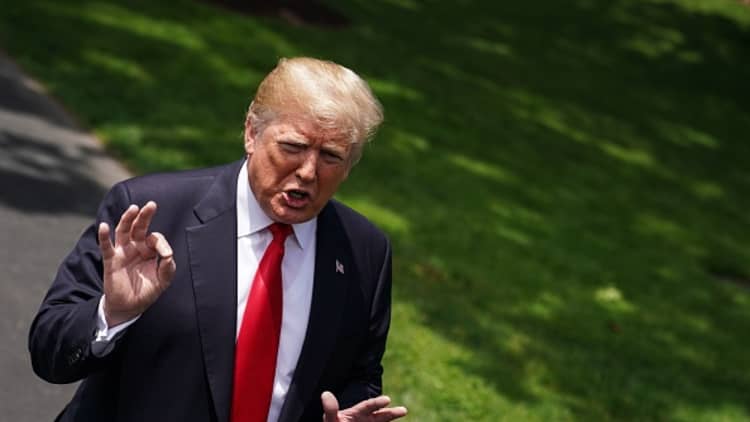U.S. Trade Representative Robert Lighthizer says NAFTA negotiators are making progress and will continue to engage in talks, but he reiterated the three countries are not close to a deal.
The Mexican peso and Canadian dollar slumped Tuesday amid concerns any deal could be months away, and the U.S. may try to seek bilateral talks instead. The peso also was hit after Mexico responded to U.S. tariffs on metals with a list of tariffs on U.S. steel, apples, potatoes, cheeses, bourbon and pork, for which it is the largest export market.
Larry Kudlow, the White House's top economic advisor, said Tuesday that President Donald Trump is "very seriously contemplating" separate talks with Mexico and Canada. A Canadian government official pointed out this was not the first time bilateral discussions were proposed over multilateral talks, and Mexico did not provide a comment.
The Mexican peso slid more than 1.8 percent, to the lowest since February 2017, and the Canadian dollar was off 0.4 percent, trading at 1.2979 to the U.S. dollar, the lowest since March 21.

Trump's "preference now, and he asked me to convey this, is to actually negotiate with Mexico and Canada separately," Kudlow told Fox on Tuesday.
Strategas' head of policy research, Dan Clifton, said talks to revise the North American Free Trade Agreement have definitely taken a turn for the worse, as the U.S. is seeking a 5-year sunset provision. "While we think this works out, the rhetoric could get even worse before it gets better," he said in a note.
Some analysts said they doubt Mexico and Canada would want to pursue separate discussions. "I think that Mexico and Canada want to stick together because they have more leverage negotiating together," said Carl Petersen, Latin America analyst at Eurasia Group.
Marc Chandler, Brown Brothers Harriman head of foreign exchange strategy at Brown Brothers Harriman, said he doubts Canada will agree to separate talks. "Now I'm under the impression that Mexico and Canada are coordinating their response," he said. "I do not imagine [Canadian Prime Minister Justin Trudeau] wants to enter a bilateral agreement with the U.S."
U.S. Trade Representative Robert Lighthizer said in a statement Tuesday that progress is being made, but the three countries are not close to a deal. The statement said there are differences on intellectual property, data localization, agricultural market access, de minimis levels, energy, labor, rules of origin, geographical indications, and more.
"We however are making progress and will continue to engage in negotiations," the statement said. "I look forward to working with my counterparts to secure the best possible deal for American farmers, ranchers, workers, and businesses at the earliest time."
Even as the talks continue, analysts point out that the calendar is against them. The Mexican presidential election is just weeks away, on July 1. As for the U.S., Sen. John Cornyn of Texas, the majority whip, told Bloomberg time has probably run out for Congressional approval this year. NAFTA will probably be kicked into 2019.
Leftist candidate Andres Manuel Lopez Obrador is the leading contender in Mexico's election, and his lead has been growing. "I think people are having the same conclusion I do, whether it's the election or NAFTA, Mexico is more vulnerable than Canada," Chandler said. He said there could be capital flight from Mexico around the election, and he expects NAFTA talks to be put temporarily put on hold, ahead of the election.
"Within a week or so we've got to expect NAFTA negotiations are done, pending the Mexican election," said Chandler, noting it's not clear how soon they would resume.
Petersen said if Obrador wins, as expected, he will want to be included in any NAFTA discussion. Mexican President Enrique Peña Nieto is to remain in office until Dec. 1.
"He will demand the current administration to include his team in the negotiations, and they will likely ask for concessions and changes that obviously will make things more complicated," Petersen said.
Petersen said the U.S. made the talks more difficult when it announced tariffs on Canadian and Mexican steel and aluminum. "I think it's looking more and more complicated. I think this toughened position the U.S. has taken over the last month or so and the tariffs they are imposing is complicating things. I think the incentives are still there for a deal, but this turn by the U.S. signals things are going to get way more complicated," Petersen said.
WATCH: Trump says Canada, Mexico have been difficult on NAFTA




